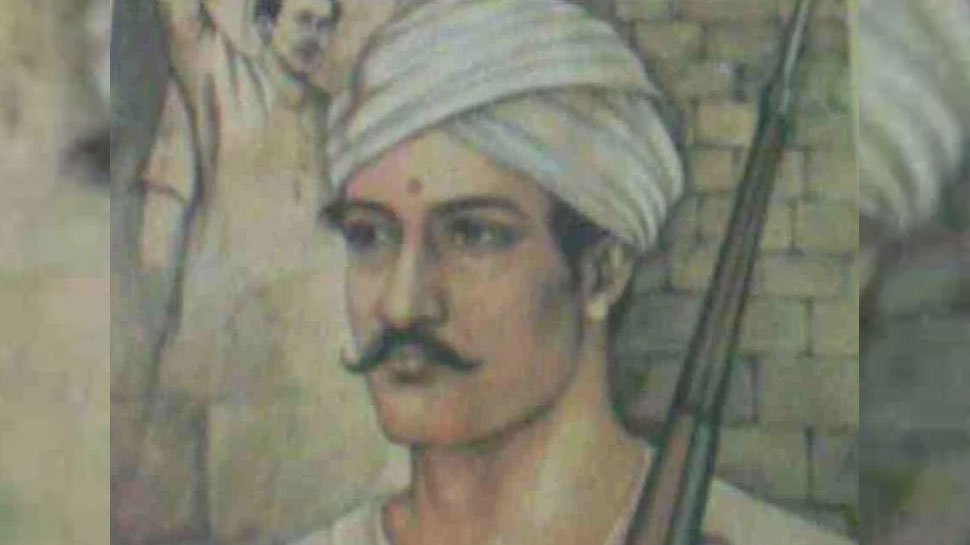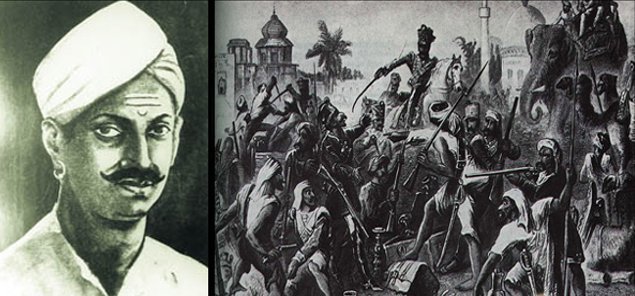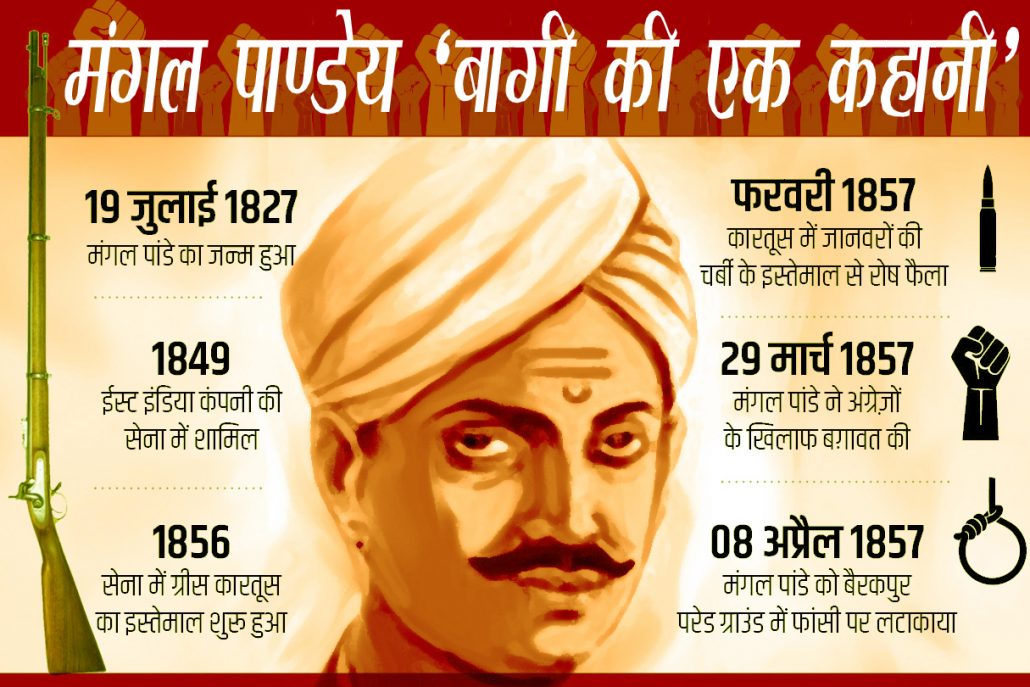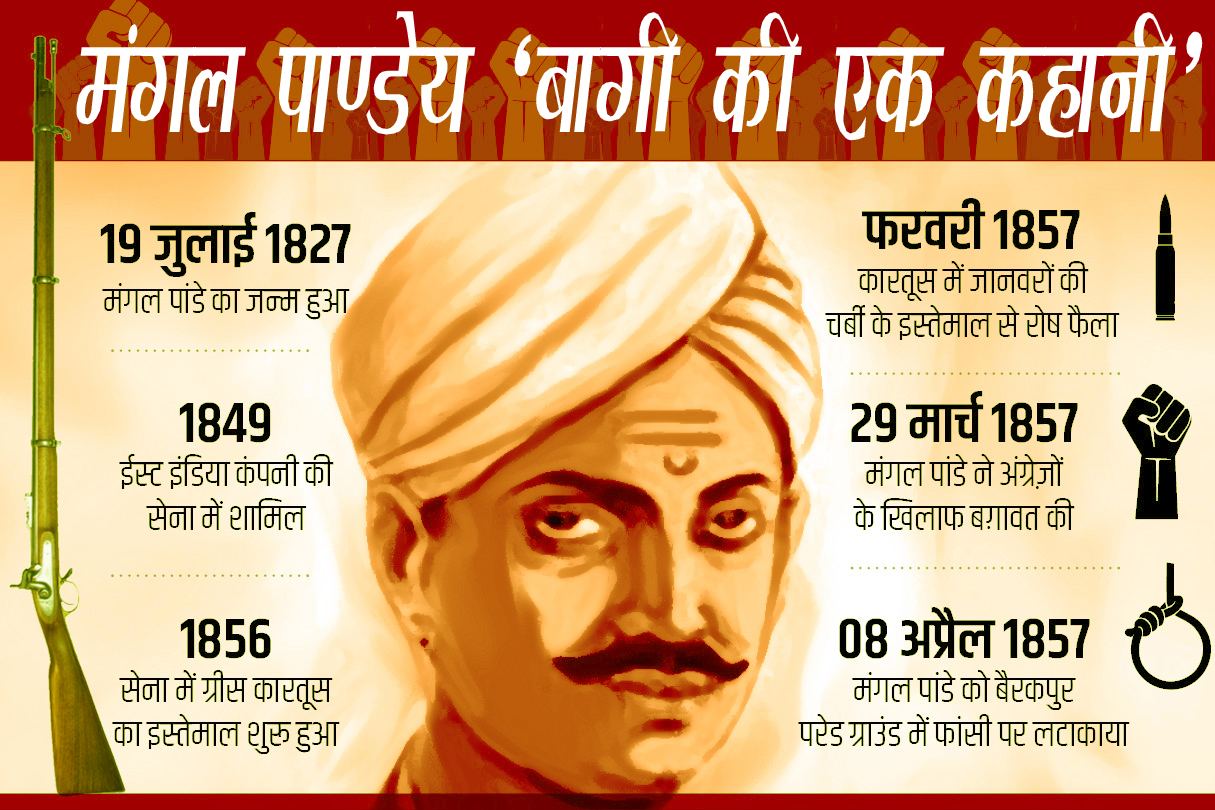The chapters of India’s independence chapter began to be written in true sense in 1857 but it is said that the rebel of the rebellion against Angaji’s rule was played by the soldier with one of them. The aura of that soldier was such that when the forerunners ordered the other soldiers to confront him, they all retreated and the turn of martyrdom turned out to be the executioners refused to hang him.
The chapters of India’s independence chapter began to be written in true sense in 1857 but it is said that the rebel of the rebellion against Angaji’s rule was played by the soldier with one of them. The aura of that soldier was such that when the forerunners ordered the other soldiers to confront him, they all retreated and the turn of martyrdom turned out to be the executioners refused to hang him. Perhaps that Indian soldier was a warrior of independence. He was none other than Mangal Pandey, born in 1827 in a Sarayuparan Brahmin family in Nagawa, a small village in Ballia, Uttar Pradesh. Today (July 19th) is the birth anniversary of Mangal Pandey. Pandey was admitted to the army of East India Company at the age of 22 as a constable. He was a soldier of the East India Company’s 34th Bengal Infantry. In the memory of Mangal Pandey, the Government of India issued a stamp in 1984. Films and dramas have become their life. Historians have different opinions about Mangal Pandey’s revolt.

One of the historians wrote that rumors of Indian soldier being killed by the European soldiers for making and opposing Indian soldiers forcibly terrorized Mangal Pandey and on 29 March 1857, in the drunken cannabis, Had rebelled against the rule. Some historians said that due to the rebellion he became an enfield gun, in which the cartridge had to be cut off by teeth. When the soldiers came to know that the outer shell of the cartridge was made of cow and pig fat to save the seal, Mangal Pandey had raised the voice against it. English historian Kim E. Wagner wrote in his book “The Great Fear of 1857 – Rumors, Conspiracy and Making of the Indian Unmissing”, “Knowing the fear of the sepoys, Major General J. B. Heyersi, on the Hindustani soldiers It was quite rumored to have called the assault as rumor, but it is quite possible that the heresy was able to spoil the situation by confirming the rumors reached to the soldiers. The soldiers who were terrorized by Major General’s speech were also Mangal Pandey of the 34th Bengal Native Infantry. “
British historian Rosie Lilvelan Jones has also presented some similar arguments in his book “The Great Upcoming In India 1857 – 58 Untold Stories, Indian and British”. According to these historians, Mangal Pandey fired at Sergeant Major James Hewison but he survived. This incident has been told by the hand of Sheikh Paltu. During the conflict, when the lieutenant Benpade Bag reached the spot, Pandey shot him, but the target missed, Bagh also fired on Pandey with his pistol, he did not even target. If the British officers asked the soldiers to capture Mangal Pandey, all the chase was withdrawn. Paltu tried to overcome Pandey.According to Jones, when Paltu told the jamadar Ishwari Pandey that he sent four soldiers to capture Mangal Pandey, Ishwari Prasad had told Paltu a gun and said that if Mangal does not let Pandey escape then he will shoot him.

According to Jones, Mangal Pandey has cursed his colleagues and said that “you people have provoked me and now you are not with me”, and many pedestrians, including the cavalry, come towards him, Pandey has put a gun in his chest with his chest The trigger was pressed by thumb but he was saved. On April 8, 1857, Pandey was executed by the hangers of Kolkata on refusal by local hangers.

Ishwar Prasad was also hanged after Mangal Pandey. This spark of rebellion imposed by Mangal Pandey is not extinguished again. After a month, on May 10, 1857, a revolt was started in Meerut Cantonment and after seeing this fire took the whole of North India into its grip. It is said that the British had imposed 34,735 laws on Indian revolt with the rebellion so that no one like Mangal Pandey could retain his head again.





